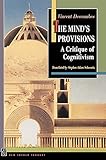The Mind's Provisions : A Critique of Cognitivism / Vincent Descombes.
Material type: TextSeries: New French Thought SeriesPublisher: Princeton, NJ : Princeton University Press, [2021]Copyright date: ©2001Description: 1 online resource (304 p.)Content type:
TextSeries: New French Thought SeriesPublisher: Princeton, NJ : Princeton University Press, [2021]Copyright date: ©2001Description: 1 online resource (304 p.)Content type: - 9781400832484
- Philosophy of mind
- PHILOSOPHY / Epistemology
- Achilles' heel
- Adult
- Anachronism
- Analogy
- Anthropologist
- Aristotelianism
- Aristotle
- Automaton
- Behavior
- Bookkeeping
- Causality
- Cerebrum
- Cognition
- Cognitive psychology
- Cognitivism (psychology)
- Computation
- Concept
- Conceptual model
- Consciousness
- Contemporary philosophy
- Conventional wisdom
- Dan Sperber
- Database
- Denis Diderot
- Dividend
- Domestic worker
- Edmund Husserl
- Effectiveness
- Electricity
- Empiricism
- Enumeration
- Explanation
- Feeling
- Foreign policy of the United States
- Formality
- French philosophy
- Genre
- Holism
- Institut de France
- Insurance law
- Intelligent agent
- Intention
- Intentionality
- Intersubjectivity
- Invention
- Jerry Fodor
- John Searle
- Linguistic turn
- Linguistics
- Loaded language
- Luc Ferry
- Mad scientist
- Marshall Plan
- Methodological solipsism
- Nachlass
- Natural kind
- Natural science
- Net income
- Obstacle
- Pascal Engel
- Payment
- Persuasion
- Phenomenon
- Philosopher
- Philosophy of Friedrich Nietzsche
- Philosophy of mind
- Philosophy
- Phrase (music)
- Political philosophy
- Principle
- Psychology
- Rationality
- Reality
- Reason
- Referent
- Requirement
- Research and development
- Research associate
- Result
- Scythians
- Social science
- Society
- Socioeconomic status
- Sociology
- Soul and Body
- Structural anthropology
- Subject (philosophy)
- Supervenience
- Symbolic computation
- Tacit knowledge
- Teleology
- The Rules of Sociological Method
- The Various
- Theory
- Thought
- Umwelt
- Understanding
- Verb
- Visual perception
- Vocational school
- 128.2 23
- BD418.3
- BD418.3
- online - DeGruyter
| Item type | Current library | Call number | URL | Status | Notes | Barcode | |
|---|---|---|---|---|---|---|---|
 eBook
eBook
|
Biblioteca "Angelicum" Pont. Univ. S.Tommaso d'Aquino Nuvola online | online - DeGruyter (Browse shelf(Opens below)) | Online access | Not for loan (Accesso limitato) | Accesso per gli utenti autorizzati / Access for authorized users | (dgr)9781400832484 |
restricted access online access with authorization star
http://purl.org/coar/access_right/c_16ec
Vincent Descombes brings together an astonishingly large body of philosophical and anthropological thought to present a thoroughgoing critique of contemporary cognitivism and to develop a powerful new philosophy of the mind.Beginning with a critical examination of American cognitivism and French structuralism, Descombes launches a more general critique of all philosophies that view the mind in strictly causal terms and suppose that the brain--and not the person--thinks. Providing a broad historical perspective, Descombes draws surprising links between cognitivism and earlier anthropological projects, such as Lévi-Strauss's work on the symbolic status of myths. He identifies as incoherent both the belief that mental states are detached from the world and the idea that states of mind are brain states; these assumptions beg the question of the relation between mind and brain.In place of cognitivism, Descombes offers an anthropologically based theory of mind that emphasizes the mind's collective nature. Drawing on Wittgenstein, he maintains that mental acts are properly attributed to the person, not the brain, and that states of mind, far from being detached from the world, require a historical and cultural context for their very intelligibility.Available in English for the first time, this is the most outstanding work of one of France's finest contemporary philosophers. It provides a much-needed link between the continental and Anglo-American traditions, and its impact will extend beyond philosophy to anthropology, psychology, critical theory, and French studies.
Mode of access: Internet via World Wide Web.
In English.
Description based on online resource; title from PDF title page (publisher's Web site, viewed 24. Mai 2022)


